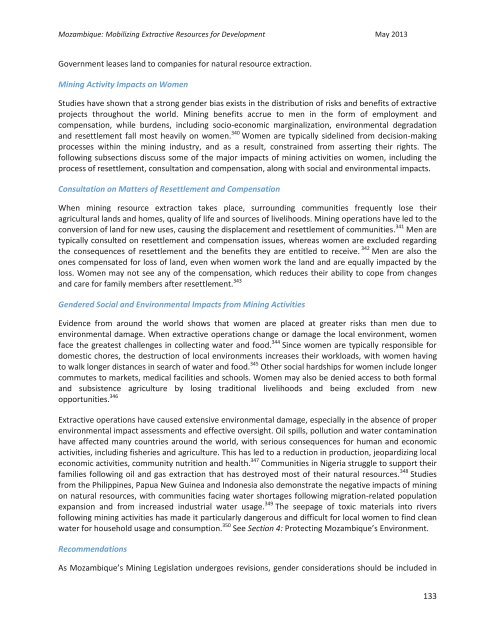Mozambique - School of International and Public Affairs - Columbia ...
Mozambique - School of International and Public Affairs - Columbia ...
Mozambique - School of International and Public Affairs - Columbia ...
You also want an ePaper? Increase the reach of your titles
YUMPU automatically turns print PDFs into web optimized ePapers that Google loves.
<strong>Mozambique</strong>: Mobilizing Extractive Resources for Development May 2013<br />
Government leases l<strong>and</strong> to companies for natural resource extraction.<br />
Mining Activity Impacts on Women<br />
Studies have shown that a strong gender bias exists in the distribution <strong>of</strong> risks <strong>and</strong> benefits <strong>of</strong> extractive<br />
projects throughout the world. Mining benefits accrue to men in the form <strong>of</strong> employment <strong>and</strong><br />
compensation, while burdens, including socio-economic marginalization, environmental degradation<br />
<strong>and</strong> resettlement fall most heavily on women. 340 Women are typically sidelined from decision-making<br />
processes within the mining industry, <strong>and</strong> as a result, constrained from asserting their rights. The<br />
following subsections discuss some <strong>of</strong> the major impacts <strong>of</strong> mining activities on women, including the<br />
process <strong>of</strong> resettlement, consultation <strong>and</strong> compensation, along with social <strong>and</strong> environmental impacts.<br />
Consultation on Matters <strong>of</strong> Resettlement <strong>and</strong> Compensation<br />
When mining resource extraction takes place, surrounding communities frequently lose their<br />
agricultural l<strong>and</strong>s <strong>and</strong> homes, quality <strong>of</strong> life <strong>and</strong> sources <strong>of</strong> livelihoods. Mining operations have led to the<br />
conversion <strong>of</strong> l<strong>and</strong> for new uses, causing the displacement <strong>and</strong> resettlement <strong>of</strong> communities. 341 Men are<br />
typically consulted on resettlement <strong>and</strong> compensation issues, whereas women are excluded regarding<br />
the consequences <strong>of</strong> resettlement <strong>and</strong> the benefits they are entitled to receive. 342 Men are also the<br />
ones compensated for loss <strong>of</strong> l<strong>and</strong>, even when women work the l<strong>and</strong> <strong>and</strong> are equally impacted by the<br />
loss. Women may not see any <strong>of</strong> the compensation, which reduces their ability to cope from changes<br />
<strong>and</strong> care for family members after resettlement. 343<br />
Gendered Social <strong>and</strong> Environmental Impacts from Mining Activities<br />
Evidence from around the world shows that women are placed at greater risks than men due to<br />
environmental damage. When extractive operations change or damage the local environment, women<br />
face the greatest challenges in collecting water <strong>and</strong> food. 344 Since women are typically responsible for<br />
domestic chores, the destruction <strong>of</strong> local environments increases their workloads, with women having<br />
to walk longer distances in search <strong>of</strong> water <strong>and</strong> food. 345 Other social hardships for women include longer<br />
commutes to markets, medical facilities <strong>and</strong> schools. Women may also be denied access to both formal<br />
<strong>and</strong> subsistence agriculture by losing traditional livelihoods <strong>and</strong> being excluded from new<br />
opportunities. 346<br />
Extractive operations have caused extensive environmental damage, especially in the absence <strong>of</strong> proper<br />
environmental impact assessments <strong>and</strong> effective oversight. Oil spills, pollution <strong>and</strong> water contamination<br />
have affected many countries around the world, with serious consequences for human <strong>and</strong> economic<br />
activities, including fisheries <strong>and</strong> agriculture. This has led to a reduction in production, jeopardizing local<br />
economic activities, community nutrition <strong>and</strong> health. 347 Communities in Nigeria struggle to support their<br />
families following oil <strong>and</strong> gas extraction that has destroyed most <strong>of</strong> their natural resources. 348 Studies<br />
from the Philippines, Papua New Guinea <strong>and</strong> Indonesia also demonstrate the negative impacts <strong>of</strong> mining<br />
on natural resources, with communities facing water shortages following migration-related population<br />
expansion <strong>and</strong> from increased industrial water usage. 349 The seepage <strong>of</strong> toxic materials into rivers<br />
following mining activities has made it particularly dangerous <strong>and</strong> difficult for local women to find clean<br />
water for household usage <strong>and</strong> consumption. 350 See Section 4: Protecting <strong>Mozambique</strong>’s Environment.<br />
Recommendations<br />
As <strong>Mozambique</strong>’s Mining Legislation undergoes revisions, gender considerations should be included in<br />
133

















